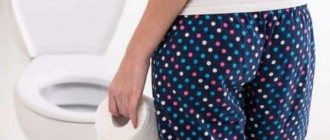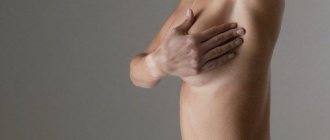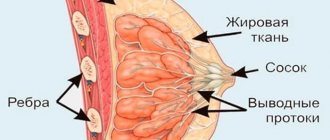Cystitis and menstruation
Cystitis, regardless of its causes, does not go away on its own. The reproductive system, which is very vulnerable during menstruation, also suffers. With a chronic infection of the urinary organs, pelvic inflammation is inevitable. Its exacerbation is due to the action of hormones, but the following factors also influence:
- changes in the microflora in the vagina - its susceptibility to pathogens increases, and then they easily spread to neighboring tissues;
- weakening of the immune system - the balance of hormones changes, the main part of them is directed to the formation of the necessary environment for the renewal of the uterine mucosa, and the body’s natural defenses are reduced;
- hygiene products – if the vaginal microflora is altered, a negative reaction to the usual components is possible;
- improper intimate hygiene - this leads to inflammation of the genital organs, which spreads to the urinary system (discharge lingering in the perineum allows microbes to rise up the urethra).
Changes against the background of these factors explain why cystitis in women begins more often before menstruation than at other times of the cycle. Immunity drops sharply, making it difficult for the body to resist infections.
Cystitis also affects menstruation. This is due to disruption of the ovaries, whose main function is the production of hormones. Inflammation interferes with this process. A hormonal imbalance occurs, and there may be a delay in menstruation due to cystitis. When they do come, the bleeding increases.
Cystitis and delayed menstruation are interconnected, because the bladder, where inflammation is localized, is adjacent to the uterus and ovaries.
Cystitis before menstruation, treatment
Almost every woman knows that menstruation directly depends on hormonal levels. The causes of cystitis before menstruation lie precisely in this fact. Plus, other factors also influence the occurrence of the disease.
These include:
- Changed microflora. The vagina becomes most susceptible to various kinds of bacteria, which during this time period easily penetrate the tissues of the organ;
- weakened immune system. During menstruation, the body directs all its reserve forces to renew the uterine mucosa;
- use of hygiene products. Changed microflora can give a negative reaction even to the usual components included in the product;
- failure to maintain intimate hygiene. The inflammatory process of the genital organs is transferred to the urinary system.
All of the above factors give an idea of why the disease occurs and why cystitis worsens before menstruation. During this period of time, a woman is least protected. This is due to a reduced level of immunity.
In order to begin treating the disease as early as possible, you need to carefully study the signs of cystitis before menstruation:
- Constant desire to go to the toilet. This is especially true at night;
- A strong tingling sensation in the lower abdomen;
- Pain very similar to contractions;
- When urinating, a woman feels an unpleasant burning and stinging sensation.
Sick women complain of severe fatigue. In this case, physical labor is not necessary at all.
In addition to all of the above, one of the signs of the disease is a change in the color of urine. It becomes dark, and you can also see foreign secretions and even flake-like particles in it.
If you see traces of blood or pus in your urine, contact a specialist immediately!
Important! An aggravated disease can cause involuntary urination. This fact, of course, cannot but affect the usual way of life.
Treatment
This unpleasant disease can be treated in different ways, but not all methods are equally effective. Most often, antibiotics are required to eliminate the infection, and folk remedies can be used as auxiliaries as part of complex therapy. The consequences of improper treatment can be very unpleasant. Therefore, the selection of therapy should be entrusted to a specialist.
Medication
Bacteria that cause cystitis quickly adapt to antibiotics, so you need to select the necessary drugs together with a gynecologist or urologist. Only a specialist, after certain tests, will be able to say which medications will affect each specific type of pathogen. For cystitis, Nolitsin is often prescribed.
The following drugs are also used:
- Tsiprolet,
- Avelox,
- Amoxiclav,
- Furagin,
- Lomflox.
Sometimes it is enough to take just one tablet of Monural. But this is a strong drug that has many contraindications, so be sure to consult a specialist first. In addition, there are cases when this medication is powerless.
If necessary, No-shpa is prescribed as an analgesic; Canephron has proven itself well as an anti-inflammatory agent. Warming will also be useful to relieve inflammation, but during critical days this option must be used very carefully.
The disease is considered cured when appropriate tests indicate this. It is important to complete treatment, otherwise cystitis may become chronic and also become resistant to the antibiotics taken.
Folk recipes
The most rational treatment would be to use herbs with antimicrobial and antispasmodic effects.
Parsley infusion:
- 1 tsp. chopped parsley herb,
- 200 ml hot water.
How to prepare: pour boiling water over the herb, close the lid, leave for 2 hours. Drink 1/3 glass before meals.
Cranberry decoction:
- 0.5 tbsp. cranberries,
- 0.5 l of water,
- 2 tbsp. l. honey
Grind the berries in a blender. Squeeze and put the resulting juice in the refrigerator. The squeezed berries should be placed in an enamel bowl and filled with water, placed on the stove and boiled for 7 minutes. Cool the resulting broth to room temperature and mix with juice from the refrigerator. Add honey. This drink will not only have an anti-inflammatory effect, but will also help boost your immunity.
Diet
A diet for cystitis in women helps reduce the painful manifestations of the disease and speed up recovery. Do not underestimate the role of dietary nutrition in the complex treatment of the disease.
A properly selected diet will benefit the entire body. And if the patient does not violate the diet recommended by the doctor even after recovery, a recurrence of cystitis will not occur.
The main points of a therapeutic diet for the diagnosis of cystitis for women are as follows:
- Do not add salt to cooked food, or add as little salt as possible.
- Eliminate all spicy, fatty, smoked foods, sauces, and seasonings.
- Drink plenty of fluids. It provides a diuretic effect.
- Avoid sugar and confectionery products.
- Remember to prevent constipation.
Preference is given to light dairy and plant foods. In this case, the portions should be small, and the interval between doses should be 2-3 hours.
You can use without restrictions for cystitis:
- raw, boiled or baked beets,
- cucumbers, cabbage, zucchini, carrots - preferably fresh or lightly stewed,
- fruits and berries from the home garden - apples, pears, cherries, watermelons, cranberries,
- all fermented milk products without flavorings and low-fat fruit fillers - fermented baked milk, kefir, yogurt, homemade cheese,
- porridge - it is best to eat buckwheat and oatmeal; rice is consumed in moderation, as it can cause constipation.
It’s great if a woman can stick to a vegetarian diet for some time. If you can’t do without meat, then it should be low-fat varieties - chicken, turkey, veal, rabbit.
You can eat 1-2 servings per week of stewed or baked low-fat fish - cod, hake, perch, pike. Instead of salt and pepper, you should use greens and parsley or dill seeds, spinach.
All food should be cooked gently with minimal addition of oil and spices. In this case, it will be very useful to purchase a steamer or multicooker to quickly prepare dietary dishes at home.
And the most important point in the diet for cystitis is compliance with the drinking regime. You need to drink constantly, not counting the consumption of liquid soups and jelly. This could be weak green tea with lemon, natural carrot or pumpkin juice, cranberry or lingonberry juice, or just drinking purified water.
You should not have a tea party with cakes and sweets - they are also prohibited now. Desserts are limited to milk porridges, cottage cheese casseroles, and berry soufflés.
How to be treated
If a woman develops cystitis during menstruation, what to do must be decided together with a urologist and gynecologist. Independent choice of medications can lead to a new round of disease, since bacteria easily and quickly adapt to antibiotics. Some of the drugs may have no effect at all on a particular pathogen.
What a woman can do, in addition to taking prescribed medications:
Do not overcool; Wash frequently and change pads; Do not eat spicy foods, do not drink alcohol, carbonated and sour drinks; Postpone the use of tampons until recovery, as they contribute to the retention of bacteria in the immediate vicinity of the genitourinary organs during cystitis.
Many reasons can cause cystitis during menstruation; treatment in this regard should be preceded by their clarification. Since pathogenic bacteria are the most common, the following drugs are prescribed:
Nolitsin; Furagin; Tsiprolet; Lomoflox; Avelox; Amoxiclav.
A wide choice of antibiotics is possible because of the same diversity of types of microorganisms that cause infection. It is impossible to choose among the many the one that will help you on your own. The wrong drug will further weaken the body and allow cystitis to progress to the chronic stage. Therefore, the doctor should prescribe an antibiotic after receiving the test results.
Recently, specialists have had access to a new drug, Monural, which specifically targets bacteria in the genitourinary system. Sometimes a single dose of 3 g of powder diluted with water is sufficient; in some cases, after 24 hours you can swallow the same dose. Monural is a potent drug, so its independent use is quite dangerous. The antibiotic has quite a few contraindications.
No-shpa and Papaverine are suitable for pain relief. As a complement to antibiotics and antispasmodics, homeopathic drugs Canephron and Phytolysin are prescribed, which have an anti-inflammatory effect and relieve painful contractions of the bladder.
Inflammation is also treated with heating. But when cystitis occurs during menstruation, this method of therapy must be used with caution. Heat increases discharge, and if a woman is too enthusiastic about this method of fighting infection, she may cause herself to bleed.
Treatment must be completed to the end, and not stop taking medications as soon as you feel relief. Cystitis is insidious and easily becomes chronic without causing much inconvenience to the woman. But at the first favorable opportunity for bacteria, the disease can return and remind itself with renewed vigor.
Herbal treatment
Despite the fairly rapid effect, products based on medicinal plants can only be considered as additional therapy for cystitis.
When choosing them during menstruation, it is important to consider the possible impact on it. With the permission of your doctor, it is useful to take:
Bearberry decoction at the rate of 1 tbsp. herbs per 250 ml of water. The plant increases the acidity of urine, which bacteria do not like; Parsley infusion. 1 tsp finely chopped plant is infused in 200 ml of boiling water for 2-3 hours and drunk in small portions an hour before meals. The seasoning contains vitamin C, which improves immunity and reduces pain during bladder contractions; Dill water, which is prepared from 3 tbsp. raw materials and 1 cup of boiling water in a water bath for 15 minutes. After cooling, filter it, add liquid to 200 ml and drink 3 glasses a day. This diuretic and antibacterial agent is excellent for cystitis that occurs during menstruation; An infusion based on a collection of lingonberry leaves (2 parts), cap plant (2 parts), wintergreen leaves (2 parts), kopeck root (3 parts), knotweed (4 parts), horsetail (1 part). Mixture in the amount of 1 tsp. infuse in 200 ml of boiling water in a thermos for 3 hours. Drink 1/5 of a glass 4 times a day. This is an anti-inflammatory and analgesic collection.
Contrary to existing ideas about infection, cystitis during menstruation is by no means harmless. Frequent exacerbations of the disease are a signal of a pathological process in the reproductive sphere. If you start it, limiting yourself to symptomatic treatment, it can end with endometriosis, endometritis, purulent inflammation, and neoplasms. And these are factors that threaten future termination of pregnancy or infertility.
Before using any medications, you should consult a specialist doctor. There are contraindications.
Many factors can affect the menstrual cycle. Therefore, women suffering from cystitis are very concerned about whether cystitis can cause a delay in menstruation and how this affects their health.
Pathology during menstruation
The causes of cystitis during menstruation lie in pelvic inflammation. When a chronic infection is present in the appendages, it is activated due to decreased immunity during critical days. Pathogenic bacteria from the intestines and vagina penetrate the urinary canal through a shortened route - along with menstrual flow. Then they rise to the bubble.
Blood is also a favorable environment for pathogenic bacteria. Therefore, in menstrual flow they begin to actively grow and divide.
Critical days are not easy for many, and cystitis and menstruation at the same time is a combination that only worsens well-being. Abdominal pain is often present due to sloughing of the mucous membrane and uterine contractions. Cystitis during menstruation adds new symptoms:
- frequent urination with pain;
- lethargy;
- pain in the stomach;
- feeling of a full bladder;
- atypical impurities in the urine;
- elevated temperature.
Where does the inflammation come from?
Cystitis can be caused by several reasons:
Pathogenic bacteria that are always present in the body, but are activated under the influence of various circumstances; Pathogenic microorganisms received from a sexual partner; Uncontrolled use of medications; Injury to the bladder mucosa during removal of kidney stones.
The female reproductive system is closely adjacent and closely connected with the urinary system, and their influence on each other is inevitable. Pathogenic bacteria, which are the main cause of cystitis, easily reach the reproductive organs. Therefore, interest in how cystitis affects menstruation is natural.
Reasons for development
This happens because bacteria, which normally exist in the uterus, multiply much more actively during menstruation. A nutritious and moist environment creates all the conditions for increasing their numbers. And the processes occurring in the body contribute to the rapid penetration of bacteria into the urethra through the genital tract, as a result of which inflammation of the bladder is activated.
Let's take a closer look at the reasons that cause cystitis during menstruation. It should be noted that in most cases this occurs against the background of a concomitant disease, the existence of which the woman may not even suspect:
- Changes in the hormonal levels of the body.
- General weakening of the immune system.
- Severe hypothermia.
- The presence of an inflammatory process in the uterus or appendages. This is the main culprit that causes cystitis during menstruation. The reason is that due to the active proliferation of bacteria, inflammation spreads to other organs of the genitourinary system.
- Candida fungus or yeast is such a common problem that most women simply do not pay enough attention to it. But in vain, because the presence of a fungal infection is an aggravating factor.
- Failure to comply with personal hygiene rules. At first glance, is it worth talking about this in our time? There are a huge number of hygiene products on sale that will help keep your genitals clean at any time. But the practice of doctors shows that some pads and napkins are too expensive for their patients, and some brands cause an allergic reaction. Therefore, warm water and soap remain the ideal way to maintain hygiene.
- Physiological features. The location of the urethra and anus can be different, but their distance from each other is of particular importance. The closer they are, the more likely it is to transfer bacteria. This is also facilitated by wearing uncomfortable underwear and synthetic thong panties.
The reasons for the development of bladder inflammation lie in chronic inflammatory pathologies of the urogenital system. Pathogens are most active during menstruation.
Inflammation is caused by:
- gonococci;
- streptococci;
- coli;
- viruses;
- fungi;
- allergens;
- toxic substances.
Microorganisms can cause cystitis from using tampons and pads. If hygiene products are not changed in a timely manner, ideal conditions are created for their reproduction and penetration into the bladder.
In the absence of proper treatment, the acute form of the disease gradually becomes chronic. Getting rid of it is much more difficult.
The reasons for the development of cystitis after menstruation are:
- infection from vaginal discharge into the bladder through the urethra;
- allergies to hygiene products;
- development of infections transmitted through sexual contact;
- penetration of Candida fungi into the genitourinary tract, causing inflammation and thrush;
- activation of inflammatory processes caused by hormonal changes;
- the presence of inflammation in the uterine appendages.
Causes of cystitis during menstruation
What is the reason for the occurrence of cystitis during menstrual periods? To find the source of the disease, you need to visit a urologist and gynecologist.
The most common causes of cystitis during menstruation are:
- active growth of pathogenic microorganisms due to poor personal hygiene. Blood clots become a favorable environment for the development of bacteria. When menstrual flow stagnates in the perineum, pathogenic microorganisms quickly enter the urethra;
- inflammatory processes in the genital organs. Often, inflammatory processes in the appendages or in the uterus do not bother a woman for a long time (and are detected only at an appointment with a gynecologist); during menstruation, pathogens of inflammation in the genitals can easily enter the bladder;
- changes in intestinal microflora. If a woman is diagnosed with thrush, which is provoked by fungi of the genus Candida, then during menstruation these protozoan microorganisms multiply in large numbers and can enter the urethra;
- allergies to personal hygiene products. The variety of products for individual use during menstrual periods is amazing. But there are often cases when a woman experiences allergic reactions from pads in the form of irritation of the bladder (allergens act on the organ through the urethra).
During menstruation, the decisive factors for such rapid and active growth of bacteria, viruses or yeast-like fungi are: decreased immune strength, hormonal fluctuations in the woman’s body and lack of personal hygiene during menstruation.
After menstruation
Since the immune system is restored, the body is less vulnerable. Therefore, a woman may feel that cystitis has worsened after menstruation, although this is often not the cause of pain in the lower abdomen and increased urge to go to the toilet.
Probably both inflammation of the bladder due to bacteria entering it through the urethra with secretions, and:
- allergies to intimate hygiene products;
- irritation of the bubble caused by the components of the gasket material;
- venereal disease;
- candidiasis.
Cystitis after menstruation
There are quite common cases when signs of cystitis and the disease itself manifest themselves after menstruation. Women do not understand what is happening because the body is completely renewed and is not as susceptible to the appearance of bacteria as during menstrual periods. The discharge may not stop, but may already have a dull white color.
Why do I have cystitis after menstruation? There are several reasons for this, and they have characteristic differences than in other periods of the menstrual cycle:
- discharge can enter the bladder and cause an inflammatory process;
- irritation caused by intimate hygiene products. It is worth saying here that an allergic reaction can occur instantly;
- venereal infections. Viruses and bacteria, along with secretions, very quickly enter the bladder;
- thrush.
Symptoms
Signs of cystitis depend on the degree to which it has reached. If the disease is expressed in acute form, then the woman is bothered by pain during emptying of the bladder, pain in the lower abdomen, temperature changes, and malaise. Chronic cystitis is an insidious disease, which is characterized by a course without obvious signs.
If cystitis worsens, it can be recognized by the following symptoms:
- constant trips to the toilet “in small ways”;
- false urge to urinate;
- severe cutting pain at the time of urination;
- the presence of pus and traces of blood in the urine;
- nagging pain in the lower abdomen.
If the above symptoms are detected, it is important to visit a specialist in time so that he can establish a final diagnosis. If cystitis is not advanced, it is much easier to cure it than an acute or chronic disease.
Symptoms of cystitis before menstruation
Many women do not feel their best during their periods. If signs of cystitis appear during menstruation, this can significantly reduce the usual rhythm of life.
Symptoms of cystitis during menstruation:
Urologist about cystitis: Do not buy expensive drugs, not all of them treat cystitis, I did research and found the most effective and cheapest remedy! Find out about the drug
- urination occurs with a feeling of pain in the perineum;
- urine comes out often, but in small quantities;
- periodic or constant pain in the lower abdomen;
- sometimes body temperature may rise;
- general deterioration of health;
- cloudy urine.
In some women, frequent urination is associated with physiological characteristics. This can happen during menstruation due to an increase in the volume of the genital organs (in particular the uterus), which begin to put pressure on the bladder.
In such cases, frequent urge to go to the toilet is not associated with diseases of the urinary system, but still an examination by a doctor and tests will help determine the true cause.
Cycle disorder after recovery
After cystitis, there may be a delay in menstruation, and this is more likely than during an exacerbation of the disease. When it becomes chronic, inflammation gradually spreads to nearby organs, including the ovaries. Their work is disrupted, hormonal levels are disrupted. So your period may be delayed more than once due to cystitis. It happens that this happens every month.
Delayed menstruation after cystitis is not the only complication. In the absence of adequate treatment, there is a risk of purulent infections and tissue damage, which can only be treated surgically.
Whether there can be a delay in menstruation after treated cystitis depends on the characteristics of the body. With proper therapy, menstruation returns to normal. The norm is a short delay due to antibiotics and a weakened body. More abundant discharge and changes in the duration of menstruation are possible.
How to solve a problem
First of all, the doctor prescribes antibacterial drugs to the woman to eliminate inflammation. This is necessary because cystitis can be caused by an infection entering the body. Antispasmodics and diuretics are also used. The patient is advised to drink plenty of fluids to flush the bladder.
To restore the menstrual cycle after treatment for cystitis, the doctor prescribes medications that restore ovarian function and hormone production.
For each woman, a separate course of treatment is used, taking into account the age and individual characteristics of the body.
The condition of the reproductive organs must be monitored. Deviations in their work can deprive a woman of the opportunity to feel the joy of motherhood. Therefore, at the first suspicious symptoms, you should contact a specialist.
We recommend reading:
Cystitis is called inflammation of the walls of the bladder, predominantly of bacterial etiology (sometimes the disease can be caused by Candida fungi). This disease is difficult to treat and quite unpleasant: when urinating, a woman feels a burning sensation and sharp pain in the genital area.
A course of medication is necessary for cystitis
In order to remove the main symptoms, it is often enough just to take some medications prescribed by your doctor. But the treatment will not end there: in the next few weeks, cystitis will reappear during menstruation.
What is the connection between menstruation and cystitis, signs of inflammation in the bladder? What is the treatment for menstruation with cystitis?
Prevention
To reduce the risk of cystitis, a woman needs to follow simple rules:
- Always dress appropriately for the weather. In the cold season, be sure to insulate the lower part of the body.
- Do not overcool your body.
- Take vitamin-mineral complexes and medications to strengthen the immune system.
- Visit a doctor in a timely manner and treat any identified diseases of the genital organs.
- Have one sexual partner.
- Use pads and tampons as hygiene products in very rare cases.
- Organize your daily routine and establish a healthy diet.
- Maintain genital hygiene regularly.
- Wear only high-quality underwear made from natural cotton.
- If any unpleasant symptoms occur, consult a doctor immediately.
Cystitis is a very insidious and dangerous disease that requires immediate medical intervention. If you let the disease take its course, it will develop, inflammation will spread to neighboring organs, and this is dangerous due to the appearance of severe complications, including infertility.
Delayed menstruation after cystitis
Cystitis affects menstruation and this is a fact. Sometimes after complete recovery, menstruation does not begin again. What is this connected with?
Irregularity of the cycle should alert a woman and force her to see a doctor. Do not forget that if you have or have had sexually transmitted diseases and the treatment was not carried out properly, the pathogens of the virus will not disappear from the body. In simple terms, they will simply subside for a while, and then they will make themselves felt again, but in a more severe form. It is for this reason that measures need to be taken in time.
Cystitis poses a danger not only to the urinary system, but also to the genitals. They are in close proximity to each other and, therefore, inflammation can move from one organ to another. Even after getting rid of cystitis, a woman may be diagnosed with other equally dangerous and unpleasant diseases.
The disease affects not only your overall health, but also your usual lifestyle. The woman experiences pain and discomfort and, of course, suffers stress due to the current situation. There may be a delay in menstruation or, on the contrary, more abundant discharge.
If you have cystitis, then you do not need to self-medicate - this will only worsen the situation. The tests and testimony of a specialist will help you choose the right treatment and improve your health.
Cystitis before each menstruation or a periodic disease is a very serious problem that undoubtedly needs to be dealt with.
Prevention
- prevent hypothermia;
- replacing gaskets at high intervals;
- Avoid smoking and drinking alcoholic beverages. It is also necessary to exclude spicy foods and fast food from the diet;
- do not use tampons. These hygiene products trap bacteria and provoke an inflammatory process.
Cystitis is far from a safe disease that goes away on its own. If it is started, it can cause infertility. Therefore, if you understand that all the symptoms point to this disease, immediately seek medical help.
As for pregnant women, they should be extremely careful. During the process of bearing a child, cystitis can cause not only discomfort, but also harm the fetus. You also need to understand what exactly triggered the inflammatory process.
Of course, it is best to overcome the disease before conception. If cystitis occurs in the early stages of pregnancy, women are prescribed medications that are safe for both the expectant mother and the baby. Before taking any medications, you must consult your doctor.
Diagnostics
To determine whether cystitis can cause a delay in menstruation and disrupt menstruation, it is necessary to examine the hormonal levels. However, the first thing a woman should do is take a pregnancy test. If it shows a negative result, then you should get tested.
If there was a delay due to cystitis, it is important to start treatment as quickly as possible. Diseases of the genitourinary system are dangerous because they can cause infertility.
It is recommended to take tests at the very beginning of the cycle to identify hidden diseases. Prescribed:
- Ultrasound;
- blood test for hormones;
- laparoscopy;
- X-ray or MRI of the head (possible dysfunction of the pituitary gland).
Preventive measures
To minimize the risk of cystitis, you can take certain preventive measures. They will also be useful if you experienced symptoms of inflammation at the end of the last cycle. To prevent this from happening again in the future, it is necessary to take certain preventive measures.
- The main measure is proper hygiene during menstruation. Timely showering, washing and changing pads and tampons significantly reduce the risk of cystitis. It is advisable to avoid tampons if the body is predisposed to cystitis.
- Natural linen will provide good breathability and reduce the risk of allergic reactions.
- Every six months you need to visit a gynecologist. If you have already had inflammation of the urinary system in the past, you should also visit a urologist every six months.
Prevention is also useful in the chronic form of the disease. This way you cannot get rid of the pathology, but you can reduce the frequency and intensity of its symptoms.
Gynecological products for one-time use for hygienic purposes are a real salvation for the modern woman. Regarding pads, women have no [...]
Each of us strives to be healthy, to become a mother, perhaps more than once. Therefore, worries about why menstruation started earlier [...]
A beautiful, even tan can decorate any girl. To avoid lying on the beach for hours, women like to visit the solarium. The summer season is too […]
With the summer season comes the time for vacations, when everyone flocks to the beaches and the sea. An indispensable attribute of relaxation is a beautiful tan. Summer […]
Urgent help for cystitis in women using folk remedies
| Symptoms | Herbal collection |
| Frequent urination | Chamomile, motherwort, string, lemon balm, valerian, hops, trefoil |
| Painful urination | Chamomile, clover, thyme, calamus, maple, willow, celery, yarrow, black currant, flax seed |
| Hematuria | Pumpkin seed, flower, linden, yarrow, nettle, St. John's wort, flax seed, blackberry leaf, chamomile |
| Urinary retention | Licorice root, carrot seed, dill herb and seed, birch leaf, yarrow |
| Urinary incontinence | Chicory, marsh wild rosemary, St. John's wort, centaury, strawberry leaf, elecampane root, lemon balm, peppermint, violet |
Cystitis at the end of the cycle
Women's sexual health largely depends on the stability of hormonal levels. Before menstruation, the content of these substances in the body changes, and the exacerbation of the disease is associated precisely with this process.
Also, cystitis before menstruation could worsen for the following reasons:
- Weakness. Before the onset of critical days, the body becomes sensitive due to reduced immunity. It is easier for pathogenic organisms to move, so they quickly enter the genitourinary system, causing inflammation.
- Poor hygiene. The mucus released at the end of the cycle provokes increased proliferation of harmful bacteria. Improper washing, frequent use of panty liners, and aggressive soaps irritate the urethral mucosa.
- Hypothermia. Shortly before critical days, signs of cystitis often indicate excessive freezing of the body. This can happen not only in winter or autumn, but also on warm days due to swimming in open springs, etc.
- Microflora. Shortly before your period, the vaginal environment changes, becoming more susceptible to harmful microorganisms. It happens that pathogens leave the vagina, spreading to other organs, including the bladder.
- Pressure. Before menstrual flow, the uterus increases slightly in size, pressing on other organs. Not all women and girls feel this influence. But it can easily be confused with cystitis due to the frequent urge to go to the toilet.
How to prevent disease
If there were signs of an inflammatory process in the past month, a woman should do the following:
- take vitamins for immunity;
- exclude douching;
- refuse scented panty liners;
- do not use products that cause irritation.
It also wouldn't hurt to visit your doctor. He will tell you exactly why cystitis worsened before menstruation, and will prescribe treatment if necessary. Without medications, the disease can become chronic, appearing further only at the end or beginning of the menstrual cycle.
Cycle disruption due to cystitis
Inflammation of the bladder can cause a delay in menstruation. As a rule, a woman detects discharge of a whitish or yellowish tint. This phenomenon is accompanied by severe pain.
Sometimes they deprive a woman of sleep, which causes her to develop chronic fatigue and depression.
Delay of regula during the treatment of cystitis is often due to the use of antibacterial drugs and general weakening of the body.
A woman needs to remember that if her period is delayed by more than a week, she needs to urgently consult a gynecologist.
Menstruation after cystitis is usually painful. This is due to irritation of the genitourinary organs due to the inflammatory process.
Symptoms
The characteristic manifestations of the disease are:
- Frequent urination. In this case, the bladder does not fully empty; residual urine accumulates in it, causing additional discomfort.
- The presence of cutting, burning, tingling during urination. In the acute phase, pain is the most severe.
- The appearance of constant aching and nagging pain in the lumbar region.
- Feeling weak.
- Increase in body temperature to 38 degrees.
- Irritability or depression.
- In the morning and evening there is a strong urge to urinate. If they continue at night, then the woman suffers from insomnia caused by pathological activity of the bladder.
- Headache.
Change in urine color. Cystitis begins with this sign during menstruation. The urine becomes intensely yellow and acquires a pungent odor, and mucus appears in it. In addition, mucus and pus are released from the urethra.
Cystitis at the beginning of the cycle
With good immunity, the body’s work can not only suppress the proliferation of pathogenic microorganisms, but also prevent their movement to other organs. But during menstruation, the protective functions weaken. Therefore, the body is no longer able to effectively resist bacteria. It is also easier for pathogens to move during bleeding when the pathways to the uterus, ovaries and urethra are open.
Cystitis during menstruation can be caused by the following:
Viruses
Inflammation can be caused by the common flu, GI (herpetic infection) and other diseases of this group. The main sign of damage to the bladder is the presence of blood clots in the urine, and it is also painful for the patient to go to the toilet during menstruation.
Fungi
The most common pathogen is Candida. The infection may not affect the reproductive system when the fungus enters the gastrointestinal tract and then into the urinary system.
Parasites
This form of the disease is extremely rare. Women who have vacationed in exotic countries are at risk. Infection occurs while swimming in open water.
Non-infectious pathogens
There are medicinal, allergic, and interstitial cystitis. An accurate diagnosis is made after collecting anamnesis and conducting blood and urine tests. Find out whether you can donate urine during your period for testing in one of our articles. The specialist can also perform ultrasound, endoscopy and cystoscopy.
Causes and symptoms
When menstruation occurs simultaneously with cystitis, the following is added to such provoking factors as reduced immunity, poor hygiene and allergies to soaps and gels:
- Current inflammation in the uterus and ovaries.
- Lack of a certain hormone.
- Infection of the genital organs.
- Venereal diseases.
The likelihood of a bladder infection during menstruation is much higher than in the middle of the cycle. Rejection of the endometrium starts a cleansing process in the reproductive system. The presence of blood creates favorable conditions for pathogens, which make it much easier to get to the urea.
Signs of the disease manifest themselves differently in each woman. Often the symptoms resemble the course of ordinary cystitis. But the discomfort may intensify against the background of monthly bleeding, which changes the characteristics:
- Scanty and painful discharge of blood.
- Heavy menses with clots.
- Unusually long or short periods.
With the development of cystitis, menstrual flow does not always change its character, but there is often a short-term or long-term delay.
Diagnosis and treatment
Girls who have experienced this disease can immediately determine that they have cystitis. Patients develop the following symptoms: a burning sensation when urinating, they often run to the toilet, the urine becomes cloudy, weakness appears, a slight temperature (up to 37.5), etc.
Diagnostics
Only a doctor can make a final diagnosis. Cystitis is treated by a gynecologist and urologist. First, he interviews the patient, then asks for a general urine test and culture, takes smears from the urethra and vagina, etc. He may prescribe cystoscopy, ultrasound and other studies. Only after a thorough examination can treatment be prescribed.
If you have been prescribed an ultrasound of the bladder while you have your period, you can do it, it will not affect the results. As for vaginal ultrasound of the pelvic organs, experts prefer to examine a woman 3-5 days after the critical days are over.
If your critical days have not yet ended, urine culture and general analysis are not recommended. Doctors say that a general urine test cannot be taken during this period, as it will reveal uterine epithelium and an excess of red blood cells. It is not advisable to take a urine culture during menstruation. If the situation is such that an urgent examination is required, the doctor may prescribe it, but the results will be inaccurate; the analysis may show excess protein in the urine. Therefore, it is better to repeat these studies after the critical days are over.
You should also not take a smear during your period, as the discharge will make the results unreliable. But if an urgent examination is required or the girl must undergo a smear regularly, for example, so that the doctor can monitor the growth of bacteria, it may be prescribed. But these are exceptions to the rule.
Treatment
A treatment regimen for cystitis during menstruation should be thought out and suggested by a doctor. He must know how the infection got into the urinary tract, as well as determine the type of pathogen. This determines what kind of medicine he will prescribe. It will most likely be an antibiotic. There is no point in giving the name of the drug: it is selected individually, depending on what pathogens were detected.
Healing cranberry juice, which copes well with the disease, will also help. Herbs include bearberry, lingonberry leaf, and horsetail.
You should not take herbs without talking to your doctor. It is also better to study the contraindications first. Thus, cranberries should not be eaten by those who suffer from gastrointestinal diseases, for example, ulcers, gastritis with high acidity. It is contraindicated for hypotension.
A doctor may recommend a dairy-vegetable diet; he will advise you to exclude salty foods and everything spicy from your diet, and give up alcohol. A woman should drink a lot to quickly remove toxins from her body.
Cystitis can appear both before and during menstruation, since during this period the female body is weakened. It often occurs because girls have inflammatory diseases of the pelvic organs. During critical days, you will not be able to undergo some examinations. But it’s better to see a doctor, get a referral for tests, undergo the necessary examinations, and then start treatment.
Treatment of the disease
The main rule when choosing a drug is to accurately identify the causative agent of the inflammatory process. That is why it is impossible to treat cystitis at home without visiting a hospital. Incorrectly selected medications negatively affect the body, making its protective functions even weaker. As a result, the disease becomes chronic.
For infectious cystitis, a gynecologist may prescribe the following antibiotics:
Herbal preparations are not able to cure pathology. Therefore, they are used as additional therapy:
- Cyston;
- Lingonberry leaves;
- Cranberry extract;
- Canephron;
- Phytolysin.
Your doctor may also prescribe medications to relieve pain and spasms.
All medicines, including traditional medicine, must be used under the strict supervision of a physician. At home, a woman only risks removing the symptoms without affecting the root cause of the disease.
Frequent urination and cystitis are not exactly the same thing. A woman’s condition with this pathology is also characterized by pain, burning sensation when urinating, and changes in the nature of urine. Often the onset of monthly bleeding is delayed precisely because of inflammation of the bladder. It is not worth leaving the disease unattended, because cystitis is easier to cure in the early stages without serious consequences.










